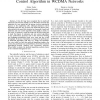Free Online Productivity Tools
i2Speak
i2Symbol
i2OCR
iTex2Img
iWeb2Print
iWeb2Shot
i2Type
iPdf2Split
iPdf2Merge
i2Bopomofo
i2Arabic
i2Style
i2Image
i2PDF
iLatex2Rtf
Sci2ools
100
click to vote
ICC
2007
IEEE
2007
IEEE
Simulative Analysis of a Multi-Cell Admission Control Algorithm in WCDMA Networks
— It has for long been recognized that in multi-cell wide-band code division multiple access (WCDMA) networks the admission of a new session into the system can have undesirable impacts on the neighboring cells. Although admission control algorithms that take into account such multi-cell impacts have been studied in the past, little attention has been paid to multi-cell admission and rate control algorithms when traffic is elastic. In this work, we propose a model for multi-cell WCDMA networks to study the impact of admission and rate control algorithms on key performance measures such as the class-wise blocking and dropping probabilities, block error rates and the overall throughput. By means of simulation we compare the performance of multi-cell algorithms with that of a single cell algorithm. For voice traffic, we find that multi-cell algorithms improve the session drop and block error probabilities in both of the examined heterogenous (termed "Hotspot" and "Hotr...
Related Content
| Added | 02 Jun 2010 |
| Updated | 02 Jun 2010 |
| Type | Conference |
| Year | 2007 |
| Where | ICC |
| Authors | Gábor Fodor, Gustavo Azzolin |
Comments (0)

